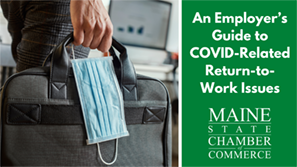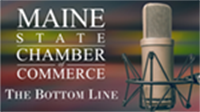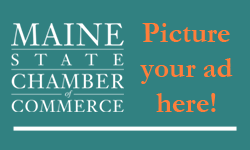|
|
|
The COVID-19
Edition for Monday, June 22, 2020 |
To view this edition of Impact online,
click here. |
|
Welcome to
your COVID-19 Impact newsletter! |
|
|
As a valued member of
the Maine State Chamber of Commerce, we plan to stay in touch with you
several times each week through emails like this one and on Facebook and Twitter, until the pandemic passes. We
intend to provide you with the latest state and federal information, as well
as highlighting the creativity and innovation that is occuring here in Maine
during this unpredictable and rapidly changing time. To assist you in
navigating the uncertainties ahead, we have created a diverse and
comprehensive collection of web-based resources to help you take care of yourself and your family, your employees, your business, and your community. |
|
|
Do you have a question? ASK THE EXPERTS. |
We are here to
help in any way we can! |
|
To Protect Public Health,
Mills Administration Postpones Reopening of Indoor Bar Service Across Maine |
|
While outdoor seated bar service is still permitted, indoor
bar service presents a higher risk of COVID-19 transmission and is linked to
outbreaks in several other states |
|
The Mills Administration
announced today that it is postponing
the reopening of indoor service at bars to protect public health given
the higher risk of COVID-19 transmission in such settings. Under the
Administration's Restarting Maine's Economy plan, bars across Maine have been
able to reopen for outdoor service and were tentatively scheduled to resume
indoor service on July 1 (Stage 3). However, given the elevated health risk
presented by bars, along with major outbreaks in other states linked to the
reopening of bars, the Administration is postponing indoor service until
further notice. Bars can still provide outdoor seated service to patrons, and
the Bureau of Alcoholic Beverages and Lottery Operations will work closely
and promptly with businesses to establish or expand their outside capacity.
The Administration said last week that it was evaluating the reopening of
indoor bar service. Indoor service at bars
presents a significantly elevated risk of COVID-19 transmission. Indoor
service bars typically feature crowds often in close contact with one another
often without tables or other ways of keeping people apart. Smaller spaces at
many bars make physical distancing very difficult. Further, individuals may
be less likely to wear face coverings at bars and, in some instances, may be
speaking at a higher volume - both of which increase the risk of COVID-19
transmission. The action also follows recent reports of COVID-19 outbreaks
linked to the reopening of bars in states like Florida, Texas, Louisiana, and
Idaho. |
|
|
An Employer's
Guide Tuesday, June
23, 2020 11:00 a.m. to
12:00 p.m. |
|
Maine employers have been
faced with many challenging issues from the COVID public health emergency. In
this
webinar, we now turn our focus to the return-to-work phase, which
raises many employment-related concerns, such as properly preparing the
workplace for the new reality under OSHA and CDC recommendations, determining
how employee recalls will work, ongoing unemployment, accommodation claims and
disability related issues, potential other leave application, and similar
topics. This session will navigate these and other related issues and provide
an opportunity for questions. Hosted by the Maine State Chamber of Commerce,
our presenter for this webinar is Anne-Marie Storey, partner at Rudman
Winchell. |
|
|
WEBINAR SERIES SPONSORS: Bangor Savings Bank, Central Maine Power Company, and Additional webinars will be
forthcoming, and sponsorship
opportunities are available. Registration or general questions can be
directed to Angela Arno, director of programs and events for the Maine State
Chamber of Commerce, by emailing [email protected] or
calling (207) 623-4568, ext. 104. |
|
|
Maine May Lose $66M in Tax
Revenue Because of COVID-19's Impact on Hotels |
|
This afternoon, Mainebiz reported that Maine stands to
lose
$65.9 million from state and local tax coffers this year due to the
impact of the COVID-19 crisis on hotel operations, according to a new study.
An analysis by the American Hotel & Lodging Association and Oxford
Economics shows the sharp drop in travel caused by the pandemic will
drastically reduce tax revenues. They include levies on lodging, sales,
gaming, personal income and corporate income, as well as taxes paid for
unemployment insurance and other government programs. That means Maine could be
short $40 million in lodging taxes that would typically have been incurred,
and will also lose out on an estimated $16.8 million from legalized gambling
proceeds. The figures do not include the property taxes generated by hotels,
estimated to total about $9 billion nationally each year. In 2018, the hotel industry
directly generated nearly $40 billion in state and local tax revenue across
the country. But the pandemic and resulting public health restrictions have
led many lodging establishments to close at least temporarily, and forced
many guests to cancel bookings. The downturn has spurred a group of Maine's
tourism and hospitality businesses to propose an emergency plan for the
industry, to be paid for with $800 million from the state's federal funding
from the CARES Act. The AHLA said in a news release that 2020 is expected to
be the worst year on record for hotel occupancy. |
|
FAME Enhances Special
Financing for Maine Businesses Affected by Covid-19 |
|
Improvements made to OLA loan limits and pro-rata insurance
for existing debt refinancing for Maine businesses affected by COVID-19 |
|
In an effort to keep pace with the evolving financing needs of its customers during the pandemic, the Finance Authority of Maine (FAME) recently approved additional changes to its special COVID-19-related program offerings. At its June 18 meeting, FAME's board of directors approved an increase in loan limits for its COVID-designated OnLine Answer (OLA) loan insurance program from $100,000 to $250,000 per lender loan and also approved an increase in its pro- rata insurance coverage for refinancing existing debt from 40% to 50%. For the refi program, paper applications only will be accepted, and there are specific criteria outlined at FAME's COVID-19 Relief Programs webpage. These two programs, as well as other COVID-relief programs outlined below, have limited funding and will sunset on September 30, 2020, unless extended by the FAME Board. |
|
In Teleconference with
Maine United Way, King Emphasizes Need to Help Working Families Amid Pandemic |
|
U.S. Senator Angus King participated in a teleconference with Maine United Way leadership representatives, as part of his continuous effort to stay connected to Maine people throughout the coronavirus pandemic. During the call Senator King received updates from the United Way on the impacts of the coronavirus on Maine communities, and highlighted the importance of the Earned Income Tax Credit (EITC), the Child Tax Credit (CTC), and Medicaid expansion to help working families weather the pandemic. Senator King is a cosponsor of the Working Families Tax Relief Act, legislation that would provide tax relief for working people and families by expanding these credits - benefiting 400,000 Maine people, including 164,000 children - as well as an advocate for nonprofits, which are facing unprecedented struggles due to the coronavirus pandemic. |
|
Senator Collins Warns of
Spike in Cybercrime Attempts During Pandemic |
|
Since March, federal agencies have detected an average of
18 million phishing attacks per day |
|
U.S. Senator Susan Collins,
the Chairman of the Aging Committee, is warning Mainers to be
on alert for increased cybercrime during the ongoing pandemic. Scammers
are sending fraudulent emails and text messages, a practice known as
"phishing," to attempt to get victims to divulge personal information or to
deliver malware to their personal computers and smartphones. Due to a
nationwide increase in teleworking during the coronavirus crisis, these
phishing attacks are becoming more common. Since March, federal agencies and
their private-sector partners have detected an average of 18 million phishing
attacks per day and a 37 percent increase in phishing attacks on mobile
devices - mostly through text messages. According to the Federal Trade
Commission, Americans lost nearly $39 million to coronavirus scams and
malware attacks in the first quarter of 2020 alone. |
|
Maine Businesses Are
Rethinking Air Quality As They Emerge From Virus Restrictions |
|
Today, the Bangor Daily News reported that, with
health officials telling businesses to circulate
as much clean, outside air as possible inside buildings as employees and
customers return, the head of Trademark Federal Credit Union realized the
large windows in the new South Portland location presented a problem. Air quality has been part of
the consideration by Gov. Janet Mills and health officials as the state is
reopening, since outdoor transmission of the virus has been found to
be relatively rare. Restaurants were first allowed only to have takeout,
then outdoor dining, and finally to resume indoor dining recently. While it's
unclear how varying degrees of air quality upgrades affect transmission of
the virus, one answer to assuring people, experts say, is to provide
assurances that the business has done everything it could to make for a safe
environment. How Maine is Advising Workplaces to Safely Reopen: The
U.S. Centers for Disease Control and Prevention has published guidance for
offices on its website.
It says properly used air purifiers could reduce
airborne contaminants, including viruses. The Maine CDC recommends that
guidance as well, said spokesperson Robert Long. Parts of the guidance are
also included in specific business checklists on the Maine Department of
Economic and Community Development website. Read more here. |
|
Thursday, June 25 | The
Bottom Line Podcast with U. S. Senator Susan Collins |
|
|
|
U.S.
Senator Susan Collins will be this week's special guest on The Bottom Line podcast. She joins The Bottom Line
co-hosts Dana Connors of the Maine State Chamber of Commerce and John
Williams of Williams Broadcasting to discuss federal programs related to the
COVID-19 pandemic's impact on the economy. To listen live, please visit Williams Broadcasting and
scroll down to "Listen Online" at the bottom of the homepage. To listen to the archived recordings,
please visit The
Bottom Line page on the Maine State Chamber's website. In addition, The Bottom Line podcast can be heard
on iTunes, iHeart Radio, Soundcloud, Stitcher Radio, Spotify and radio.com. |
|
Providing Books to Maine
Students |
|
Maine educators were recently surveyed about critical needs of their students. Books were highlighted as a top priority for students of all ages. Supporting reading is essential for students to continue to thrive in schools. Making certain that our students, particularly our youngest readers, have easy access to books during the end of the school year and throughout the summer is crucial for preventing summer slide. Even with yeoman-like efforts
by Maine teachers and a hands-on approach from the Maine Department of
Education to ensure all Maine students have been able to continue learning
remotely during the pandemic, we know that learning over these past few
months has inevitably been disrupted. In addition to the school year
disruption, student achievement often widens during the summer, an outcome
referred to as summer slide. Summer slide accounts for as much as 85 percent
of the reading achievement gap between lower income students and their
middle- and upper-income peers. Providing students with appropriate books
will help address this challenge. Not only does summer reading enable
students to continue practicing foundational skills, but it opens the world
to students through stories and knowledge building around topics of interest. We need your help to ensure students across
our 16 counties have access to books, an essential commodity. Here are a few ways you can
support Maine students: 1 2020 Maine Books Challenge: Educate Maine is leading this
initiative to provide students with books while supporting local bookstores.
You can purchase an online or physical gift card at one of Maine's
independent bookstores. Every $10 donation provides a book for a Maine
student. Every donation will be matched by the Law Offices of Joe Bornstein
up to $5,000. Teachers across Maine will help coordinate book distribution to
students. If interested in supporting this effort, please email Katherine at [email protected]. 2 Scholastic Books: This company has offered significant discounts
to help get books to Maine students. For example, a $1,000 donation can
support 300 books for 100 students. A $5,000 donation can support 1,500 books
for 500 students. If interested in supporting this effort, please email Megan
Diver at [email protected]. 3 Community Book Donations: Gently used books are also needed
across Maine. We are seeking community drop off spots at local employers
throughout the 16 counties. If your business is interested in becoming a
location for books to be collected, please email Megan Diver at [email protected]. Books will be distributed to
students directly through their schools and at local meal sites throughout
the summer. Additional information about summer literacy initiatives can be
found here.
Thank you for supporting Maine students. |
|
|
||
|
|
To join these advertisers |
|
|
TO
UNSUBSCRIBE, CLICK HERE. |
NOTICE: In an ongoing effort to thwart
the activities of online hackers, the Maine State Chamber |








